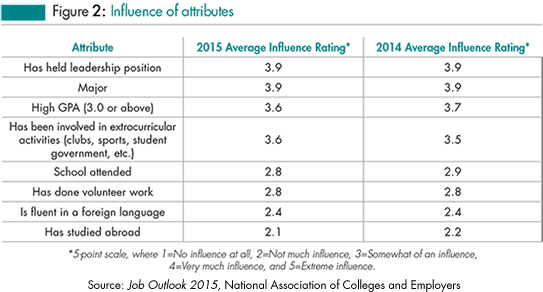Researching Employers
by Alicia Bervine, Anne Orange, and Jennifer Whetstone-Jackson
Researching employers is perhaps the single-most important activity you will undertake in your job search. The information you uncover can help you:
- Discover organizations that are a good match for you,
- Identify the organization’s goals and needs,
- Tailor your resume and cover letter to highlight your skills and experiences that match the employer’s needs,
- Know what questions to ask employers,
- Demonstrate your interest in and enthusiasm for the organization,
- Answer interview questions with confidence, and
- Make an informed employment decision.
Unfortunately, many students overlook the importance of research when undertaking a job search or looking for an internship. In fact, it’s common for employers to complain that potential job candidates haven’t “done their homework,” and instead come into the interview with little or no knowledge about the organization. These candidates flounder, asking questions that could be easily answered by a cursory look at the company website or literature. Needless to say, they make a poor impression, because employers often assume lack of research means lack of interest.
Where should you begin?
Start by developing a list of organizations in which you might be interested—companies that have the types of jobs or do the type of work that interests you. These could be organizations that visit your campus for career fairs, information sessions, and interviews, or they might be companies you have identified on your own as potential employers. An added bonus: You may discover lesser-known organizations that might be a match for your skills and interests. (Having a problem with this step? Talk with a career counselor in your campus career center for direction.)
Research companies to obtain information in each of the following categories:
- Organizational overview: age, size, financial outlook, growth, and structure
- Trends/issues in the industry
- Mission, philosophy, objectives
- Public or private or foreign-owned
- Location of plants, offices, stores, subsidiaries
- Products and/or services
- Names of key executives
- Competitors
- Sales, assets, earnings
- Growth history and current growth activity
- Current challenges
- Major achievements and activity, issues, news
- Career paths, training, benefits
- Company culture
For specific industries or sectors, see:
- ThomasNet.com, for brief information about manufacturers in 67,000 categories in the United States and Canada.
- GuideStar.org, for brief information on more than 1.8 million U.S. nonprofit organizations.
- Idealist.org, for information on 71,000+ nonprofit organizations worldwide.
- USA.gov, for a list of federal agencies (click on “Find Government Agencies” on the home page).
- USChamber.com, for a list of employer members (click on Chambers and then “Chamber Directory”).
Don’t forget the resources available in your campus career center: Check your career center for information about employers that recruit at your school. Finally, this list of resources is a starting point; never underestimate the power of a search engine. Simply “Google” the name of the organization you are interested in and see what information and news is returned!
Other Research Resources
Start with the organization’s website.
Well-constructed and comprehensive sites will have abundant information, and for the sites that are not as comprehensive, it is still important to learn what is there. This is what the organization deems most important for you to know.
Look at university libraries’ research databases.
These will have information not available elsewhere for free, including financials, industries, market news, trade data, and more. Choose the business databases for information for the public, private, and nonprofit sectors. Some of the most relevant databases are Hoovers.com, Dun & Bradstreet Million Dollar Directory, Thomson One, Business Source Premier, IBISWorld, and Mergent Online.
Check your public library.
Public libraries have online research tools available free with a library card. In the business category, you may find ReferenceUSA, with information for more than 20 million U.S. companies, including nonprofit organizations. Speak to a reference librarian for additional options to research organizations.
Look at social networking sites, including LinkedIn.
LinkedIn has become a leading source of inside information about organizations.
- On LinkedIn, find companies of interest and once found, click on the “Follow” tab to receive updates posted by the company.
- Join groups related to any career interest appealing to you.
- Contribute to discussions and connect with other members.
- Use the advanced search to find alumni working in companies in which you are interested.
Try the Employer Locator on Careeronestop.
Go to www.acinet.org; in the site search window, search for “Employer Locator.” This is a U.S. government database of nearly 12 million U.S. employers with brief information about each. It’s a good resource for finding employers in a specific industry in a particular geographical location.
Look for small, independent companies in the local newspaper.
Alicia Bervine is Program Manager, College of Arts & Sciences; Anne Orange is Career Librarian; and Jennifer Whetstone-Jackson is Program Manager, College of Engineering & Computing, at the University of South Carolina, Columbia.
Courtesy of the National Association of Colleges and Employers.














 Ever thought about working overseas after college? Are you planning to study abroad during your time at Baylor? Are you at Baylor on a student visa, and interested in working in the United States after graduation? If you answered “yes!” to any of these questions, then GoinGlobal is a great resource for you to learn about career opportunities and apply for jobs.
Ever thought about working overseas after college? Are you planning to study abroad during your time at Baylor? Are you at Baylor on a student visa, and interested in working in the United States after graduation? If you answered “yes!” to any of these questions, then GoinGlobal is a great resource for you to learn about career opportunities and apply for jobs.